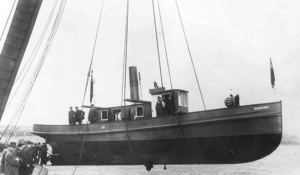Dorion—Lying on its side, nestled in some trees at the Hurkett Cove Conservation Area in Dorion, Ontario, lies the hull of a tugboat. Its history a source of pride for many, the Rossport was one of the first tugboats to be made at the Port Arthur Shipbuilding Company. Built in 1915, it was 52’4” long, 6’6” deep, 12’ breadth and could carry 19 tons. The steel tugboat had a large, powerful propeller and could go quite fast. All one had to do was keep feeding the engine with wood or coal. But as Chuck Gerow explained, the engine wasn’t very efficient. Designed with a one pass boiler, most of the heat went up the stack.
Captain Fred Gerow was born in Nipigon, and worked with his father in the fishing industry. His parents Mary Jane and Captain George, along with his siblings, relocated to Rossport in 1902. Fred and his brother Charlie married sisters from the Aultman family. Fred and Annie had one daughter that became a nun and three sons. At the age of 29, Fred took possession of the newly built Rossport and continued the family tradition of commercial fishing.

Fred’s occupation wasn’t an easy one. Wood was his choice of fuel because it was so plentiful, but it would take two to three hours for the engine to build up enough steam to get the tugboat moving. Then an additional three to four hours would be needed to reach his fishing territory, at the west end of St. Ignace Island. Fred and his crew stayed on Lake Superior for two to three days at a time, which meant their wives had to run the households and care for the children. In the early years, these strong and resourceful women had the added burden of living in an isolated village with no roads or electricity.
There’s an old saying that fishermen can’t swim a stroke. Yet there were very few accidents that can be remembered by cousins Jim and Chuck Gerow. The reason being that Fred and his crew had an instinctual understanding of the winds, currents, waves and weather. They could be out in 45 degree cross waves or blinded by thick fog, and they’d always find their way safely back to the village.
There were fishing seasons for herring, pickerel, and whitefish. But Fred’s main catch was lake trout. In the early years, after the fish were netted, they’d be gutted, salted and placed in barrels that would be shipped to markets. Later, after the CPR came through, fish were boxed in ice and shipped by rail. There wasn’t a lot of money to be made in commercial fishing. It was as Chuck Gerow explained, “a hand-to-mouth-existence.” But despite the hardships and demands Fred and his crew endured, it was a satisfying life. One that many were unhappily forced out of when the fish populations began to dwindle and the sea lamprey invaded Lake Superior.
On May 19, 1953, Captain Fred Gerow was out on his tugboat, when he became ill. He continued to direct his crew from the wheelhouse. But by the time the Rossport came to port, he was unable to walk and had to be carried to his house. As the oldest living fisherman in Rossport, he died an hour later. His passing sadly felt by all those who had had the pleasure of knowing him.
Six years later, the tugboat was purchased by Alonzo Nuttall. Also a commercial fisherman, he had the Rossport towed to Hurkett Cove. He tossed some rubber tires into the engine, and people to this day still talk about the black smoke pouring out of its stack as it made its way into Black Bay. Alonzo’s goal was to overhaul the tugboat, but the government regulations made it impossible to achieve. And even though the Rossport hasn’t been in Lake Superior for over 50 years, many local people don’t see it as an eyesore or something that should be scrapped. To them, it’s a comforting reminder of an era when fish were plentiful and men could earn a living doing what they loved.
